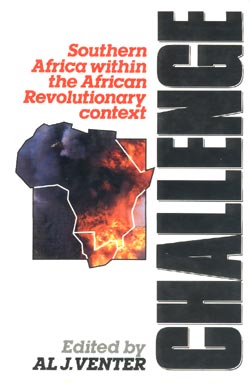
Challenge
Southern Africa is in a state of political flux. The 'necklace' is a ghastly reality to many people living there. So are nightly bloodlettings in many South African townships.
Political forces of a variety of hues, from the far left to the entrenched right seek their own solutions to problems that have bedevilled Africa for decades. Sad to say, there is no clear solution in sight, event though the pundits regularly predict anything from a breakthrough to a total collapse. The extremely vocal South African community in voluntary or involuntary exile in London, Lusaka, Harare, New York and elsewhere have been maintaining for years that change in the country is 'imminent'.
The truth is that Southern Africa - and all its composite parts, black or white - is not likely to change its character radically in any significant way. That some form of change must ultimately come, there is no doubt. A glimpse as to what form it will take will perhaps be provided by recent history, of which Africa in this era is making more than enough.
Events in other parts of this volatile continent may supply part of the answer. What happened during the sixties and seventies in countries as diverse as Angola, Rhodesia, Algeria, Kenya, Mozambique and elsewhere may shed some rays of light on forthcoming events in Southern Africa.
Many of the lessons learnt during the demise of Rhodesia are still applicable to the white South now. Some of the military events in the former Portuguese colonies are also instructive. So is a comparison between South Africa today and French Algeria yesterday.
There are European and American influences. All are dealt with. So is the role of the media. There are also the real up-to-date figures that press for a change in another dimension altogether; the Savimbis, the Kaundas, the Mugabes, the Bothas.
The result is a book of some political significance, for Al Venter has called on some of the most experienced and acute specialists in the world to help with this task. Among those who have provided comment are the American specialist on Soviet weapons and tactics, David Isby. He wrote a book for Janes on that subject; Fred Bridgland, of The Scotsman; Dr Richard Wood, formerly of Rhodesia; Simon Barber of Washington; the defence correspondent Willem Steenkamp; Ron Reid-Daly, the eminence grise of unconventional Southern African military politics; Holger Jensen, formerly of Newsweek and the Vietnam war; Gerald L'Ange, a veteran Africanist and editor of the Argus Africa News Service and Professor Willie Breytenbach of Stellenbosch, whose chapter provided the subtitle of the book.
Al Venter himself deals with several subjects which, until now, have only infrequently been touched on: South Africa and Algeria; and some of the answers to why Portugal lost its African empire.